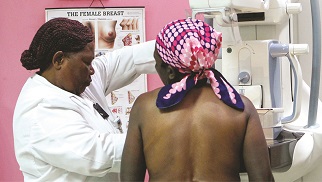
A fall-out on the COVID-19 pandemic is the impact on health care on persons with chronic and non-communicable diseases. Persons with hypertension, heart failure, diabetes, asthma, and cancer are regarded as the most vulnerable to COVID-19. Persons with such diseases are most likely to suffer the complications of COVID-19. The presence of these diseases makes COVID-19 worse. Infection with COVID-19 also makes these diseases worse. Yet these vulnerable persons are reluctant to go for scheduled reviews because of COVID-19.
The situation with persons with cancer can be dire given the peculiar nature of the disease. This higher risk for serious complications from COVID-19 for people currently diagnosed with cancer likely is because having cancer puts a strain on the body and also because certain treatments can cause people to become immunocompromised (have a weakened immune system) or have lung problems. Typically, the immune system recovers within a couple of months after you stop receiving chemotherapy or targeted therapy. But your immune system’s recovery time can vary and depends on several factors. If you received those treatments in the past, it’s not clear if you are at higher risk for serious complications from COVID-19. If you are receiving ongoing treatment with these medicines for metastatic breast cancer, your immune system is likely weakened.
Some chemotherapy medicines and targeted therapies can also cause lung problems, which could put people at higher risk for serious COVID-19 complications.
People with metastatic breast cancer in the lungs also can have lung problems that may get worse if they develop COVID-19. If you are aged or have hypertension or diabetes or obese and have breast cancer then you are more likely to suffer severe complications of COVID-19. With the advent of vaccines even though good news for all, there is still need for vigilance since we are learning about COVID-19.
As we mark Breast Cancer Awareness in October 2021, we all need to reflect on the impact of COVID-19 on persons with breast cancer. This backdrop informed my keen interest in a paper by Francescangeli et al., titled “COVID-19: a potential driver of immune-mediated breast cancer recurrence?” published in Breast Cancer Research (2020) 22:117.
The severe acute respiratory syndrome coronavirus 2 (SARS-CoV-2) pandemic is spreading in a world where cancer prevalence is rapidly growing, raising concerns about potential interactions between the two diseases. SARS-CoV-2 recruits proteins involved in cellular replication, DNA damage, metabolism, and epigenetic regulation that are also implicated in cancer pathogenesis. At the same time, COVID-19-induced inflammation may affect tumour cells and their microenvironment.
Emerging evidence suggests that COVID-19 may affect a particular stage in the tumour’s life cycle represented by dormant cancer cells (DCCs). DCCs often survive upon successful treatment of primary tumours and localize in specific microanatomical compartments of metastasis-prone organs, where they can reside in a dormant state for a clinically asymptomatic period named metastatic dormancy. At some point, these dormant cancer cells (DCCs) may reactivate in response to microenvironmental cues such as inflammatory or immune-mediated signals, thereby progressing to overt metastasis. Virtually, every patient with a previous history of cancer may harbour DCCs. In breast cancer, understanding the mechanisms underlying cancer cell dormancy and reawakening is of crucial importance due to a particularly broad window of tumour recurrence which can span up to 20 years after diagnosis. You may have come across, dear reader, persons with a diagnosis of breast cancer who had appeared to be well for several years only for the cancer to spread suddenly. This is usually triggered by several factors. Infection with COVID-19 is been identified as a trigger that awakens these dormant cancer cells.
SARS-CoV-2 infection induces the death of airway epithelial cells with the consequent release of damage-associated molecular patterns (DAMPs). DAMPs trigger the production of inflammatory cytokines and chemokines, thus recruiting monocytes, neutrophils, and T cells to the lungs. In the severe phase of COVID-19, lung inflammation leads to diffuse alveolar damage and acute respiratory distress syndrome (ARDS). The activated immune cells can start a pro-inflammatory loop resulting in systemic inflammation, widespread coagulopathy, and multiorgan dysfunction. Profound immune system alterations also occur upon SARS-CoV-2 infection, including a decrease in natural killer cells and T cells in the peripheral blood, and a dysregulated activation of monocytes, neutrophils, and tissue macrophages.
Activated neutrophils release multiple tissue-damaging products including web-like structures of proteins and DNA known as neutrophil extracellular traps (NETs). NETs entrap pathogens and provide for a high local concentration of antimicrobial components, but also create a physical barrier that hinders local access to immune cells. Several factors involved in COVID-19 may play a role in the reawakening of dormant tumor cells. The strongest evidence points to neutrophil extracellular traps (NETs) and neutrophils, which are emerging as important players in COVID-19 pathogenesis.
Acute lung inflammation and NETs have been respectively shown to trigger the exit from dormancy of breast DCCs, leading to metastasis formation. Therefore, lung inflammation and the NET generation that occur during COVID-19 could trigger DCCs reawakening, possibly acting in concert with other pro-inflammatory factors.
Studies on the long-term clinical outcomes of COVID-19 showed a high incidence of persistent symptoms after the acute disease. The possibility that inflammatory and/or autoimmune processes may be a common consequence of SARS-CoV-2 infection raises further concerns about the risks of DCCs reawakening, which may be enhanced in chronically inflamed microenvironments.
There are studies into the long-term effects of COVID-19 on cancer patients to clarify the effects of COVID-19 on the risk of pulmonary metastatic recurrence.
The association between COVID-19 and an increased risk of lung metastasis can promote the use of tailored therapies and intensified follow-up schedules in patients with previous breast cancer. The use of anti-inflammatory agents able to interfere with immune-mediated inflammatory pathways or NET formation could help decrease the risks of subsequent tumour relapse. The impact of COVID-19 on cancer (e.g.breast) opens another window for chemoprevention- flavanol-rich cocoa with its anti-inflammatory, immunomodulatory, anti-oxidant effects looks very promising in this regard.
DR. EDWARD O. AMPORFUL
CHIEF PHARMACIST
COCOA CLINIC




